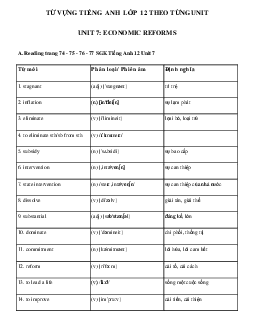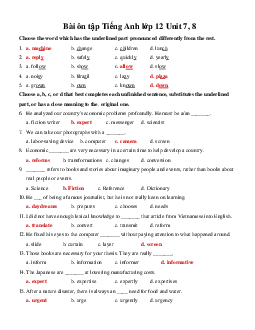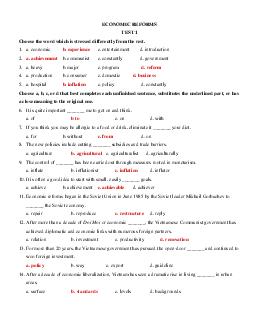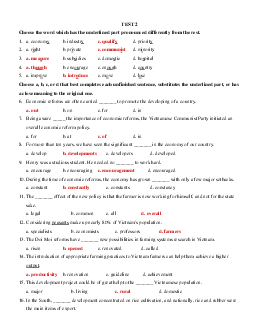













Preview text:
Giải bài tập SGK Tiếng Anh lớp 12 Unit 7: Economic Reforms
A. Reading (Trang 74-75-76-77 SGK Tiếng Anh 12)
Before you read (Trước khi bạn đọc)
Work in pairs. Ask and answer the following questions. (Làm việc theo cặp. Hỏi và trả các câu hỏi sau.)
1. What can you see in the picture?
=> The picture shows us people's life is very rustic. The living standard is very low. People live in
thatched-roof houses with earthen walls.
2. Do you think that the people in this picture lead a rich or a poor life?
=> The people in this picture lead a very simple and poor life.
3. What, in your opinion, should be done to improve the situation?
=> In my opinion, people should carry out economic reforms. They should change their old and
obsolete way of living and working.
While you read (Trong khi bạn đọc)
Read the passage and do the tasks that follow. (Đọc đoạn văn và làm bài tập theo sau.) Hướng dẫn dịch:
Một trong những biện pháp quan trọng phải thực hiện để đẩy mạnh sự phát triển của
quốc gia là thường xuyên thực hiện cải cách kinh tế. Ý thức được điều đó, tại kỳ họp
Quốc hội lần thứ sáu vào tháng 12 năm 1986, Đảng Cộng Sản Việt Nam đã khởi xướng
một chính sách cải cách kinh tế toàn diện. Vào thời điểm ấy chính sách đó thường được
gọi là "Đổi Mới". Mục tiêu của "Đổi Mới" là nhằm tái cấu trúc lại nền kinh tế của Việt
Nam và nâng cao mức sống của nhân dân.
Trước thời kỳ Đổi Mới đất nước ta trải qua rất nhiều khó khăn: nền kinh tế kém phát
triển do nền nông nghiệp truyền thống chiếm ưu thế; đất nước nghèo nàn, nhân dân
sống cực khổ; sản xuất trì trệ. Thiếu thốn trường học và bệnh viện, lạm phát thì xảy ra ở
mọi lĩnh vực kinh tế. Để giải quyết những vấn đề đó, Nhà nước ta đã đưa ra một số biện
pháp cải cách: xóa bỏ sự bao cấp của Nhà nước, chuyển quyền ưu tiên về kinh tế của
nền công nghiệp nặng thành ba chương trình kinh tế chính: sản xuất thực phẩm, sản
xuất hàng tiêu dùng và sản xuất cho xuất khẩu; giảm sự can thiệp của Nhà nước trong
việc kinh doanh; mở rộng quan hệ thương mại với tất cả các quốc gia trên thế giới và
khuyến khích việc đầu tư của các tư nhân trong và ngoài nước.
Các kỳ họp Quốc hội kế tiếp của Đảng Cộng Sản Việt Nam được tổ chức năm 1991,
1996 và 2001 tiếp tục khẳng định sự cam kết về Đổi Mới và kêu gọi sự cải cách về hành
chính và kinh tế. Dưới đường lối chi đạo của Đảng, Nhà nước đã thông qua Luật Đất
Đai năm 1993 và Luật Doanh Nghiệp năm 2000. Những bộ luật ấy đã đặt nền tảng pháp
lý cho việc giải thể các Hợp tác xã không hiệu quả, mở rộng nhiều cơ hội cho nhà nông,
và khuyến khích đầu tư của các tư nhân trong và ngoài nước.
Kể từ Đổi Mới, đất nước ta đã trải qua những thay đổi đáng kể: năng suất và xuất khẩu
nông sản không ngừng gia tăng, nông dân có quyền sử dụng đất và có quyền lựa chọn
cách sử dụng đất nông nghiệp của họ, công nhân làm việc chăm hơn vì thời giờ chính là
tiền bạc, và trẻ em, đặc biệt trẻ em dân tộc ít người, có nhiều cơ hội để được học tập và huấn luyện hơn.
Chúng ta tin rằng với sự cam kết mạnh mẽ của Đảng và Nhà nước ta về Đổi Mới, chúng
ta sẽ đạt được nhừng thành tựu lớn hơn và xây dựng cuộc sống tốt đẹp hơn cho nhân dân ta.
Task 1. Give the Vietnamese equivalents to the following words and phrases. (Cho nghĩa tiếng Việt
tương đương với những từ và cụm từ sau.) Gợi ý:
National Congress: Đại hội toàn inflation: lạm phát quốc
rennovation: đổi mới
government subsidies: sự bao cấp của chính phủ
under-developed: kém phát triển
government commitment: sự cam kết của chính phủ
dominate: chi phối, thống trị dissolve: tan rã stagnant: trì trệ
substantial: lớn lao, đáng kể
Task 2. Decide whether the statements are true (T) or false (F). (Xác định xem các phát biểu sau là
đúng (T) hay sai (F).) Gợi ý: 1. F 2. F 3. T 4. F 5. T
Task 3. Answer the following questions. (Trả lời các câu hỏi sau.)
1. When and by whom was Doi Moi officially initiated? (Đổi Mới được chính thức đề ra khi nào và bởi ai?)
=> It was officially initiated in 1986 by our Vietnam Communist Party.
2. What was the aim of Doi Moi? (Mục đích của Đổi Mới là gì?)
=> Its aim was to restructure the economy of Vietnam and to raise the living standards of the people.
3. Name the renovation measures the Government introduced to implement Doi Moi. (Kể tên một số
biện pháp cải cái mà Chính Phủ đưa ra nhằm thực hiện Đổi Mới.)
=> The measures the Government introduced to implement Doi Moi were:
eliminated government subsidies,
shifted economic priority from heavy industry to three major economic programs: production
of food, production of consumer goods and production of exports,
reduced state intervention in business,
opened trade relations with all countries in the world,
encouraged foreign and domestic private investment.
4. How has Vietnam changed since Doi Moi? (Việt Nam đã thay đổi như thế nào kể từ khi Đổi Mới?)
=> Since Doi Moi, Vietnam has undergone substantial changes. They are:
productivity and agricultural exports have constantly increased,
the farmers have enjoyed land use rights and have had greater choice on how to use their agricultural land,
the workers have worked harder,
the children, particularly those form ethnic minorities have had more opportunities to enjoy education and training.
5. What do we believe? (Chúng ta tin vào điều gì?)
=> We believe that with the strong commitment of our Party and Government to Doi Moi, we will
attract more foreign capital investment and build a better life for our people.
After you read (Sau khi bạn đọc)
Scan the passage and make brief notes of the following points. (Đọc lướt qua đoạn văn và ghi chú vắn
tắt những điểm sau.) Gợi ý: Vietnam before Doi Moi
- Economy: under-developed, dominated by traditional agriculture - Country and people: poor - Production: stagnant
- Shortage of schools, hospitals - Inflation
The Government's renovation measures
- Eliminated government subsidies,
- Opened trade relations with all countries in the world,
- Shifted economic priority from heavy industry to three major economic programs: production of
food, production of consumer goods and production of exports,
- Reduced state intervention in business,
- Encouraged foreign and domestic private investment. Vietnam since Doi Moi
- Productivity and agricultural exports: increased
- Farmers: enjoyed land rights, had greater choice to use their land - Workers: worked harder
- Children: enjoyed education and training
B. Speaking (Trang 77-78 SGK Tiếng Anh 12)
Task 1. Study the pictures and answer the following questions. (Nghiên cứu các bức tranh và trả lời các câu hỏi sau.)
1. What does each pair of pictures tell you? (Mỗi cặp tranh cho bạn biết điều gì?)
=> It tell us the contrast between the present and past situations.
2. What changes can you see in each pair of pictures? (Bạn có thể nhìn thấy những thay đổi gì ở trong mỗi cặp tranh?)
=> The new school and factory are much bigger. 1a - 1b: two school
- the left picture: small and low thatched-roof houses, no playground.
- the right picture: tall buildings with a large playground. 2a - 2b: two factories
- the left picture: the machines were old and bulky and there were a lot of workers. Much work was done by hand.
- the right picture: a modern factory with modem machines and few workers because all products are made by assembly-line.
3. What do you think people have done to achieve these changes? (Bạn nghĩ người ta đã làm gì để có
được những sự thay đổi đó?)
=> They must have taken some renovation measures.
Task 2. The country of Fantasia started its overall reforms in the early 1970s. The reform has ...
(Quốc gia Fantasia đã bắt đầu cuộc cải cách toàn diện vào đầu thập niên 1970. Cuộc cải cách đem lại
nhiều chuyển biến tích cực trong nhiều khu vực kinh tế, đặc biệt trong giáo dục, chăm sóc sức khoẻ và nông nghiệp.)
Work in groups. Suggest what the Government and the people of Fantasia have done to ... (Làm việc
nhóm. Đoán xem Chính phủ và người dân Fantasia đã làm gì để cải thiện nền kinh tế trong những khu
vực này. Sử dụng các gợi ý bên dưới.) Hướng dẫn dịch: Giáo dục:
- chương trình giảng dạy và - nhiều thiết bị và tiện nghi hơn sách giáo khoa - lương giáo viên
- nhiều trường học hơn
- nhiều học bổng cho học sinh
- phương pháp dạy và học nghèo và khuyết tật
Chăm sóc sức khỏe: - nhiều bệnh viện hơn
- lương của bác sĩ và y tá
- nhiều bác sĩ giỏi hơn
- ý thức trách nhiệm của bác sĩ và y tá
- tiện nghi và thiết bị y tế nhiều hơn - bảo hiểm sức khỏe Nông nghiệp:
- chính sách thích hợp để khuyến khích - nhiều nương, đập và hệ
nông dân làm việc hiệu quả hơn thống tưới tiêu hơn
- kỹ thuật canh tác mới và hiện đại
- tiện nghi và thiết bị nông nghiệp hiện đại hơn
- phân bón, thuốc trừ sâu, thuốc diệt côn trùng Gợi ý:
A: As we have seen, Fantasia has gained a lot of positive effects in its overall reforms since the early 1970.
B: Sure, particulary in education, health care and agriculture.
C: Well. First, what measure did it take to improve its education?
D: I think they certainly reformed the overall education system, from the curriculum, textbooks to
methods of teaching and learning.
A: And the necessary facilities in education such as schools, teaching aids, ...
B: Oh, a more important factor is teachers' salary: a noticeable pay raise.
C: What about health care? What have they done?
D: First they have built a lot of modem hospitals and moderrnized the old ones with modern equipment or facilities.
A: And the more important thing in the category is they have more highly qualified doctors and nurses.
B: And the sense of responsibility and moral conscience of doctors and nurses is always improved or encouraged
C: In addition, they introduced health insurance policy to help the poor.
A: I see there are a lot of progress and improvements in agriculture, too.
B: Sure. The government has certainly carried out many renovations in farming techniques as well as
introduceđ appropriate policies to encourage fanners to produce.
Task 3. Report to the class on the measures the Government and the people of Fantasia have taken ...
(Tường thuật trước lớp về những biện pháp mà Chính phủ và nhân dân Fantasia đã thực hiện để phát
triển nền giáo dục, chăm sóc sức khoẻ và nông nhiệp của họ.) Gợi ý:
The Government and the people of Fantasia have taken the important measures to develop their country.
First, in education, the government have renovated the curriculum, textbooks and
teaching and learning methods. At the same trime, they've replaced old and obsolete
teaching aids, equipment and facilities. The most important thing seen in education is
raising teachers' teaching skills and the pay raise.
In health care, many hospitals have been built or modernized. Doctors and nurses are
highly qualified. A remarkable reform is the inưoducing of health insurance policy to
people, which has helped the poor to enjoy die progress of medicine.
In agriculture, the Government has carried out appropriate policies to encourage
farmers to produce more effectively. They've obviously introduced new and modern
farming techniques and equipment as well as advanced fanning facilities and fertilizers.
They've also built dams and irrigation and drainage systems to help increase the outputs.
C. Listening (Trang 79-80 SGK Tiếng Anh 12)
Before you listen (Trước khi bạn nghe)
- Work in pairs. Discuss the question: "Do you think that drug-taking should be banned? Why/Why
not?" (Làm việc theo cặp. Thảo luận câu hỏi: "Bạn có nghĩ rằng việc sử dụng ma túy có nên bị cấm
không? Tại sao/Tại sao không?")
Do you think that drug-taking should be banned? Why/Why not?
=> Yes, I think that drug-taking should be banned. Because drug-taking brings about
very bad effects on not only the person himself/herself but also the whole society and
family. Anyone that uses or gets addicted to drug becomes lazy and loses all of his/her
awareness of responsibility. And they neglect to work. To make it much worse,
drug-takur's health gets worse and worse until the day his / her life comes to an end. - Listen and repeat. Tango: điệu nhảy discourage: không khuyến
drug-taker: người sử dụng tăng-gô khích ma túy
rationally: có lý, hợp lý ruin: hủy hoại solution: giải pháp unfortunately: không measures: các biện pháp
islanders: người ở đảo may
While you listen (Trong khi bạn nghe)
You will hear Dr. Brown, a world population expert, talk about the world population. Liten to the
interview and do the tasks that follow. (Bạn sẽ nghe tiến sĩ Brown, chuyên viên dân số thế giới nói về
dân số thế giới. Nghe cuộc phỏng cấn và làm bài tập theo sau.)
Task 1. Listen to the passage about the inhabitants of Tango Island and decide whether the statements
are true (T) or false (F). (Nghe đoạn văn về cư dân ở Đảo Tango và xác định xem các phát biểu là đúng (T) hay sai (F).) 1. F 2. F 3. T 4. T 5. F 6. F 7. T 8. T 9. F
Task 2. Listen again and answer the questions. (Nghe lại và trả lời các câu hỏi.)
1. What did the people of Tango discover? (Người dân Đảo Tango đã khám phá ra cái gì?)
=> They discovered a plant which contained a powerful drug.
2. What did they do with the plant? (Họ đã làm gì với cây trồng đó?)
=> They grew it all over the island.
3. What negative effects did the drug bring about? (Những hậu quả xấu mà thuốc đó mang đến?)
=> The negative effects the drug brought about were:
workers and farmers became lazy,
children did not want to go to school,
and the whole population began to run short of food.
4. How many measures did the Government take and what were they? (Chính phủ đã áp dụng những biện pháp nào?)
=> The Government took three measures:
introduced a law to make the drug illegal,
put the drug-takers into prison,
and exported the drug to other countries.
5. What did the Government of Tango decide to do eventually? (Cuối cùng Chính phủ đảo Tango
quyết định làm gì?)
=> Eventually they decided to export the drug to other countries.
After you listen (Sau khi bạn nghe)
Work in groups. Discuss the question: "Do you think that the decision of the Government of
Tango ...?" (Làm việc nhóm. Thảo luận câu hỏi: "Bạn có cho rằng quyết định xuất khẩu ma túy sang
nước khác của Chính phủ đảo Tango có là giải phải tốt hơn không? Tại sao/Tại sao không?) Gợi ý:
I don't think it's a better solution. Because it makes trading drug become popular, so
people can buy and sell the drug freely and the Government cannot prevent their people
from taking drug. It also brings about very bad effects to others countries' population.
Tapescript - Nội dung bài nghe
The inhabitants of Tango, a small island in the Atlantic Ocean, discovered a plant which
contained a powerful drug. They grew the plant all over the island and they took the
drug every day. This made it more difficult for them to think rationally - it stopped
them worrying about the future and enabled them to forget all their problems. At the
same time, it made it much easier for them to relax and enjoy themselves. And because
of the drug, the whole population of the island stopped working and spent all their time
singing and dancing and looking at the sea.
Unfortunately this had very bad effects on the country's economy. The workers and
farmers became lazy, the children did not want to go to school and the whole population
began to run short of food. This, however, did not discourage people from taking the
drug. The Prime Minister made speeches on the TV warning them about the drug, but
nobody took any notice, and before long the economy of the country was in ruins. This
forced the Government to take measures. They introduced a law to make the drug
illegal. But that only made the situation worse. The law couldn't prevent people from
taking the drug. On the contrary, the fact that the drug was illegal encouraged people to
take it more. They put the drug-takers into prison. But this did not have any effect, there
were not enough prisons for them. Eventually, the Government found a solution: they
exported the drug to other countries. This saved the islanders from having to work more
than one day a week, and allowed them to spend the rest of their time sitting in the sun
without any care in the world.
D. Writing (Trang 80-81 SGK Tiếng Anh 12)
The table below presents the achievements the Government and the people of Tango have gained in
some ... (Bảng dưới đây trình bày những thành tựu mà Chính phủ và nhân dân đảo Tango đã đạt được
trong một số lĩnh vực kinh tế sau hai thập kỷ cải cách kinh tế. Hãy xem thông tin trong bảng sau rồi làm bài tập theo sau.)
Task 1. Answer the following questions. (Trả lời các câu hỏi sau.)
1. What was the economic situation in Tango before 1980? (Tình hình kinh tế ở Tango trước năm 1980 như thế nào?)
=> The economic in Tango before 1980 is under-developed.
2. What can you say about the economic situation in Tango from 1980 to 2000? (Bạn có thể nói gì về
tình hình kinh tế ở Tango từ 1980 đến 2000?)
=> Since 1980, Tango have undergone substantial changes: branches of the economy increase steadily.
3. What do you think the Government and the people of Tango have done to achieve these results?
(Bạn cho rằng Chính phủ và người dân Tango đã làm gì để đạt được những kết quả đó?)
=> They must have carried out economic reforms.
Task 2. Based on the information given in the table, write a report of 150 words on the economic
development of Tango. Your report should include details such as: (Dựa vào thông tin đã cho trong
bảng, viết một bản báo cáo 150 từ về sự phát triển kinh tế của Tango. Bản báo cáo của bạn nên bao
gồm các chi tiết như:)
(i) tình hình kinh tế của Tango trước năm 1980
(ii) các biện pháp mà Chính phủ và nhân dân Tango đã áp dụng để vượt qua khó khăn
(ii) những thành tựu (như được trình bày trong bảng) mà họ đã đạt được nhờ cải cách Báo cáo gợi ý:
The Government and the people of Tango started their overall economic reform in the
mid 1980s. Before that time, the economy of the country was in ruins such as:
Agriculture: -0.5%, Fishery: -0.4%, Forestry: -0.2%, Industry: -0.6%, Construction:
-0.3% and Export: 0%. As a result, the economy was under-developed, the country was
poor, the people led a poor life, production was stagnant.
To solve the problems, the economic reform was applied in some sectors of the
economy. From the information from the table, we can say that since the economic
reform, Tango country has undergone substantial changes, all branches of economy
increased steadily : Export: 5.3%, rose 2.3% against 1980; Industry: 4.5%, rose 2.2%
against 1980; Construction: 6.4%, rose 1.9% against 1980. As can be seen in the table,
construction developed best, before 1980, it was only -0,3%, but in 2000, it increased to 6,4%.
In short, we believe that thanks to the economic reform, the Government and people of
will gain greater achievements and developed miraculously from a poor country to a
developing country or a very rich country.
E. Language Focus (Trang SGK Tiếng Anh 12)
Grammar and Vocabulary (Ngữ pháp và Từ vựng)
Exercise 1. Combine the sentences with although/even though. (Hãy nối các câu vớialthough/even though.) Gợi ý:
1. Although it rained a lot, we enjoyed our vacation.
2. Although we had planned everything carefully, a lot of things went wrong.
3. Even though/Although the doctor has advised him to quit, Bob (still) smokes 20 cigarettes a day.
4. Although it was cold and rainy, we managed to go to class in time.
5. Although Luong has studied English only for six months, he can speak English very well.
6. I didn't go to bed early although I was really sleepy.
Exercise 2. Complete the sentences. Using although + a clause from the box. (Hoàn thành câu. Sử
dụng although + một mệnh đề trong khung.) Gợi ý:
1. Although I was very tired, ..........
2. Although I had never seen her before, ..........
3. ................, although it was pretty cold.
4. ................, although we don't like them very much.
5. Although I didn't speak the language, ..........
6. Although the heat was on, ..........
7. ................, although I'd met her twice before.
8. ................, although we have known each other for a long time.
Exercise 3. Use your own ideas to complete the following sentences. (Sử dụng ý kiến của riêng bạn để
hoàn thành những câu sau.)
1. ................, we forgot many things.
2. ................ they were very hungry.
3. ................, he could speak the language very well make himself understood.
4. Although he had revised everything/ studied very hard, .............
5. ................, it is pretty cold/ there hasn't been any rain.



